An Analysis of Leadership and Management at Unilever: A Report
VerifiedAdded on 2020/10/05
|10
|3061
|460
Report
AI Summary
This report provides a detailed analysis of leadership and management practices at Unilever, a major consumer goods company. It begins by differentiating between the roles and characteristics of leaders and managers, highlighting their common responsibilities and distinct traits. The report then examines the functions of managers and leaders in various situational contexts, such as project management, team development, and decision-making. Different leadership theories, including system theory, contingency theory, and situational theory, are discussed, providing a framework for understanding leadership approaches. Finally, the report explores the factors within the business environment that impact operational management and decision-making, offering insights into the challenges and opportunities faced by leaders and managers at Unilever. The report aims to provide a comprehensive overview of leadership and management principles within a real-world business context.
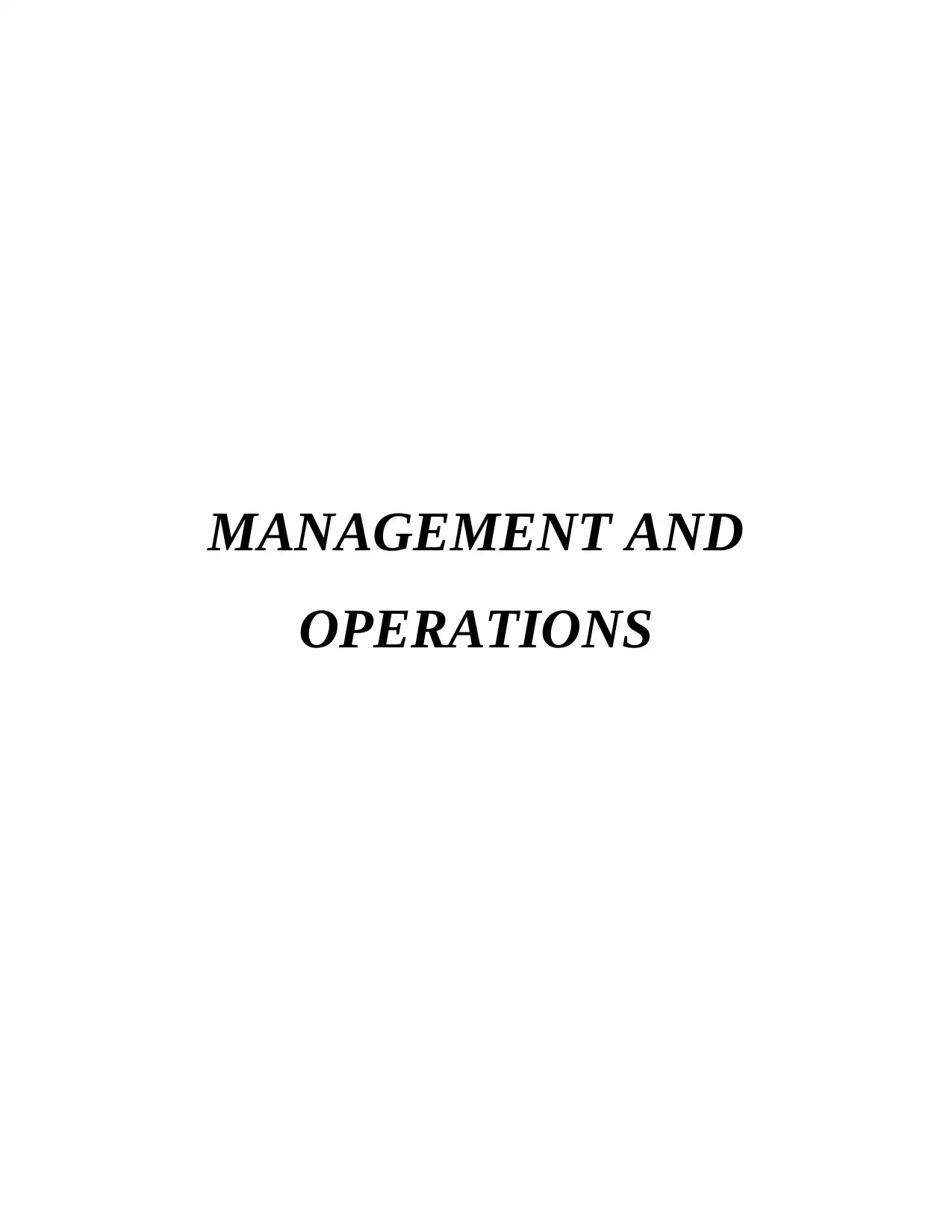
MANAGEMENT AND
OPERATIONS
OPERATIONS
Paraphrase This Document
Need a fresh take? Get an instant paraphrase of this document with our AI Paraphraser
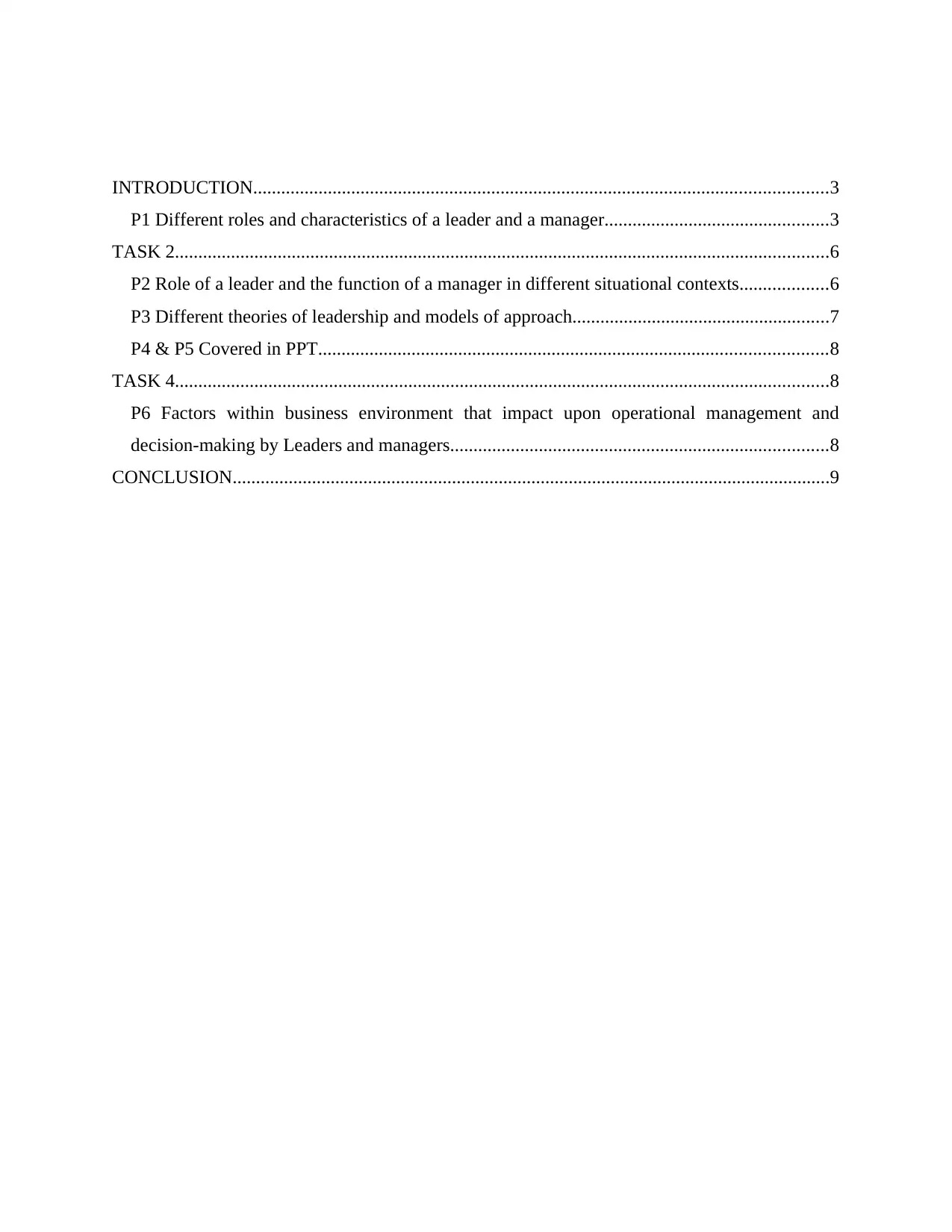
INTRODUCTION...........................................................................................................................3
P1 Different roles and characteristics of a leader and a manager................................................3
TASK 2............................................................................................................................................6
P2 Role of a leader and the function of a manager in different situational contexts...................6
P3 Different theories of leadership and models of approach.......................................................7
P4 & P5 Covered in PPT.............................................................................................................8
TASK 4............................................................................................................................................8
P6 Factors within business environment that impact upon operational management and
decision-making by Leaders and managers.................................................................................8
CONCLUSION................................................................................................................................9
P1 Different roles and characteristics of a leader and a manager................................................3
TASK 2............................................................................................................................................6
P2 Role of a leader and the function of a manager in different situational contexts...................6
P3 Different theories of leadership and models of approach.......................................................7
P4 & P5 Covered in PPT.............................................................................................................8
TASK 4............................................................................................................................................8
P6 Factors within business environment that impact upon operational management and
decision-making by Leaders and managers.................................................................................8
CONCLUSION................................................................................................................................9
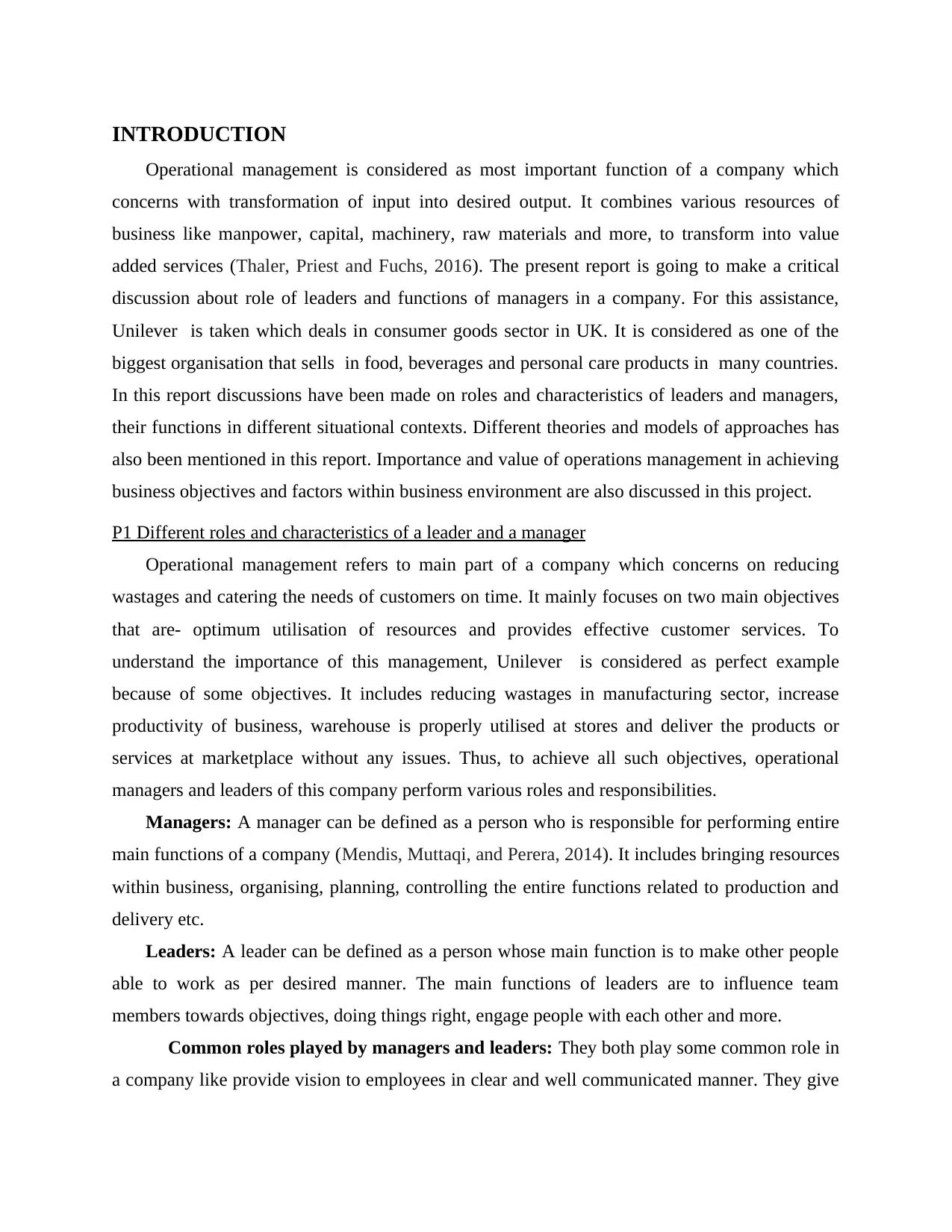
INTRODUCTION
Operational management is considered as most important function of a company which
concerns with transformation of input into desired output. It combines various resources of
business like manpower, capital, machinery, raw materials and more, to transform into value
added services (Thaler, Priest and Fuchs, 2016). The present report is going to make a critical
discussion about role of leaders and functions of managers in a company. For this assistance,
Unilever is taken which deals in consumer goods sector in UK. It is considered as one of the
biggest organisation that sells in food, beverages and personal care products in many countries.
In this report discussions have been made on roles and characteristics of leaders and managers,
their functions in different situational contexts. Different theories and models of approaches has
also been mentioned in this report. Importance and value of operations management in achieving
business objectives and factors within business environment are also discussed in this project.
P1 Different roles and characteristics of a leader and a manager
Operational management refers to main part of a company which concerns on reducing
wastages and catering the needs of customers on time. It mainly focuses on two main objectives
that are- optimum utilisation of resources and provides effective customer services. To
understand the importance of this management, Unilever is considered as perfect example
because of some objectives. It includes reducing wastages in manufacturing sector, increase
productivity of business, warehouse is properly utilised at stores and deliver the products or
services at marketplace without any issues. Thus, to achieve all such objectives, operational
managers and leaders of this company perform various roles and responsibilities.
Managers: A manager can be defined as a person who is responsible for performing entire
main functions of a company (Mendis, Muttaqi, and Perera, 2014). It includes bringing resources
within business, organising, planning, controlling the entire functions related to production and
delivery etc.
Leaders: A leader can be defined as a person whose main function is to make other people
able to work as per desired manner. The main functions of leaders are to influence team
members towards objectives, doing things right, engage people with each other and more.
Common roles played by managers and leaders: They both play some common role in
a company like provide vision to employees in clear and well communicated manner. They give
Operational management is considered as most important function of a company which
concerns with transformation of input into desired output. It combines various resources of
business like manpower, capital, machinery, raw materials and more, to transform into value
added services (Thaler, Priest and Fuchs, 2016). The present report is going to make a critical
discussion about role of leaders and functions of managers in a company. For this assistance,
Unilever is taken which deals in consumer goods sector in UK. It is considered as one of the
biggest organisation that sells in food, beverages and personal care products in many countries.
In this report discussions have been made on roles and characteristics of leaders and managers,
their functions in different situational contexts. Different theories and models of approaches has
also been mentioned in this report. Importance and value of operations management in achieving
business objectives and factors within business environment are also discussed in this project.
P1 Different roles and characteristics of a leader and a manager
Operational management refers to main part of a company which concerns on reducing
wastages and catering the needs of customers on time. It mainly focuses on two main objectives
that are- optimum utilisation of resources and provides effective customer services. To
understand the importance of this management, Unilever is considered as perfect example
because of some objectives. It includes reducing wastages in manufacturing sector, increase
productivity of business, warehouse is properly utilised at stores and deliver the products or
services at marketplace without any issues. Thus, to achieve all such objectives, operational
managers and leaders of this company perform various roles and responsibilities.
Managers: A manager can be defined as a person who is responsible for performing entire
main functions of a company (Mendis, Muttaqi, and Perera, 2014). It includes bringing resources
within business, organising, planning, controlling the entire functions related to production and
delivery etc.
Leaders: A leader can be defined as a person whose main function is to make other people
able to work as per desired manner. The main functions of leaders are to influence team
members towards objectives, doing things right, engage people with each other and more.
Common roles played by managers and leaders: They both play some common role in
a company like provide vision to employees in clear and well communicated manner. They give
⊘ This is a preview!⊘
Do you want full access?
Subscribe today to unlock all pages.

Trusted by 1+ million students worldwide
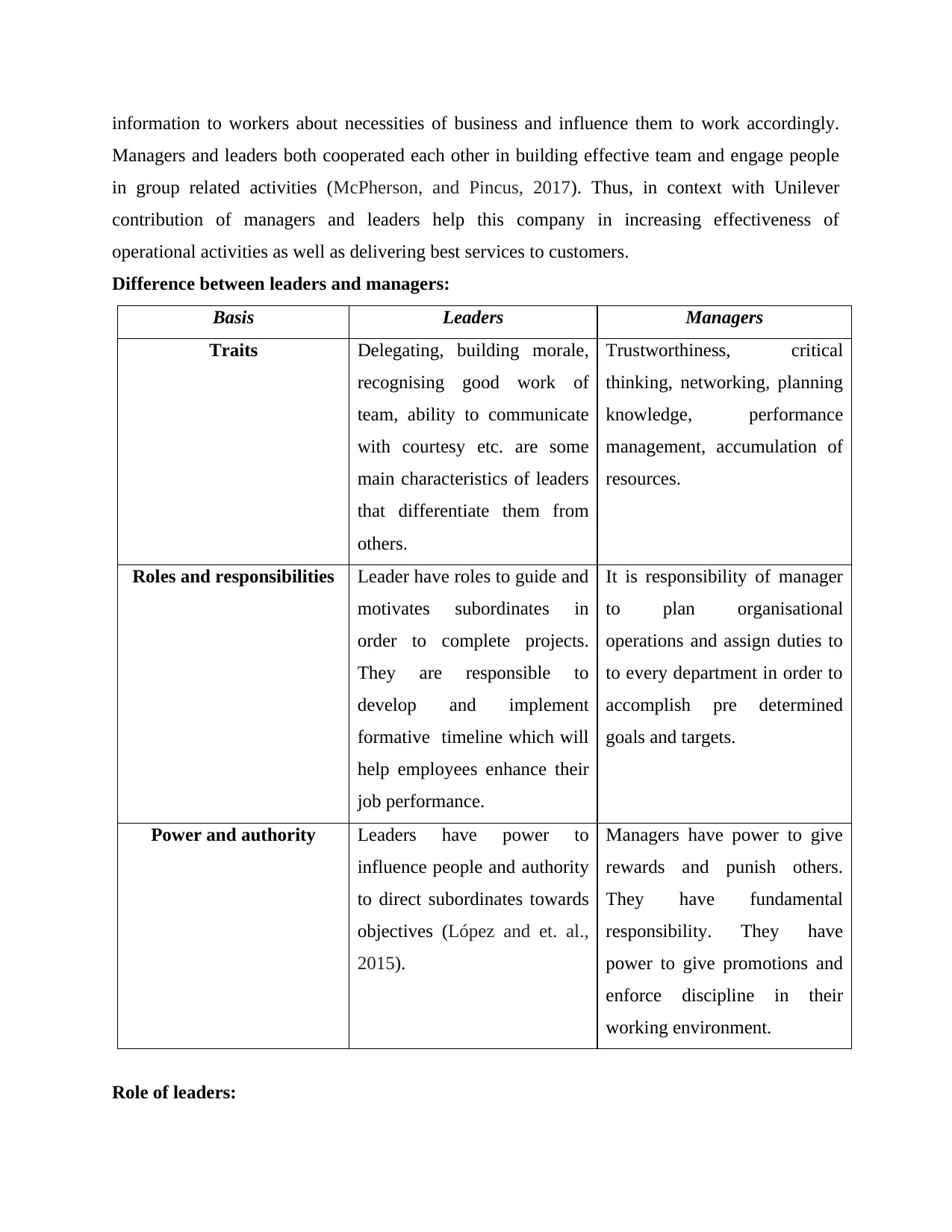
information to workers about necessities of business and influence them to work accordingly.
Managers and leaders both cooperated each other in building effective team and engage people
in group related activities (McPherson, and Pincus, 2017). Thus, in context with Unilever
contribution of managers and leaders help this company in increasing effectiveness of
operational activities as well as delivering best services to customers.
Difference between leaders and managers:
Basis Leaders Managers
Traits Delegating, building morale,
recognising good work of
team, ability to communicate
with courtesy etc. are some
main characteristics of leaders
that differentiate them from
others.
Trustworthiness, critical
thinking, networking, planning
knowledge, performance
management, accumulation of
resources.
Roles and responsibilities Leader have roles to guide and
motivates subordinates in
order to complete projects.
They are responsible to
develop and implement
formative timeline which will
help employees enhance their
job performance.
It is responsibility of manager
to plan organisational
operations and assign duties to
to every department in order to
accomplish pre determined
goals and targets.
Power and authority Leaders have power to
influence people and authority
to direct subordinates towards
objectives (López and et. al.,
2015).
Managers have power to give
rewards and punish others.
They have fundamental
responsibility. They have
power to give promotions and
enforce discipline in their
working environment.
Role of leaders:
Managers and leaders both cooperated each other in building effective team and engage people
in group related activities (McPherson, and Pincus, 2017). Thus, in context with Unilever
contribution of managers and leaders help this company in increasing effectiveness of
operational activities as well as delivering best services to customers.
Difference between leaders and managers:
Basis Leaders Managers
Traits Delegating, building morale,
recognising good work of
team, ability to communicate
with courtesy etc. are some
main characteristics of leaders
that differentiate them from
others.
Trustworthiness, critical
thinking, networking, planning
knowledge, performance
management, accumulation of
resources.
Roles and responsibilities Leader have roles to guide and
motivates subordinates in
order to complete projects.
They are responsible to
develop and implement
formative timeline which will
help employees enhance their
job performance.
It is responsibility of manager
to plan organisational
operations and assign duties to
to every department in order to
accomplish pre determined
goals and targets.
Power and authority Leaders have power to
influence people and authority
to direct subordinates towards
objectives (López and et. al.,
2015).
Managers have power to give
rewards and punish others.
They have fundamental
responsibility. They have
power to give promotions and
enforce discipline in their
working environment.
Role of leaders:
Paraphrase This Document
Need a fresh take? Get an instant paraphrase of this document with our AI Paraphraser
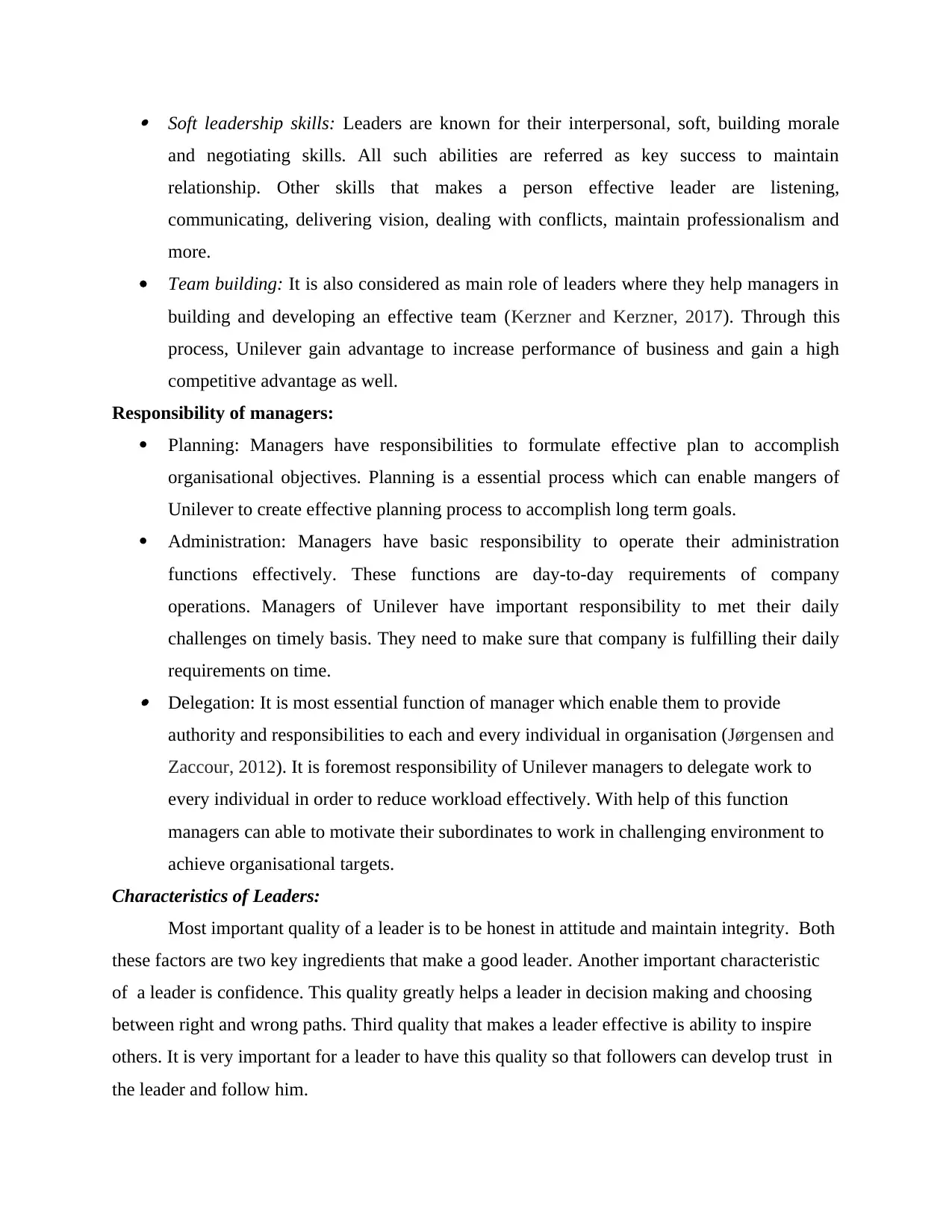
Soft leadership skills: Leaders are known for their interpersonal, soft, building morale
and negotiating skills. All such abilities are referred as key success to maintain
relationship. Other skills that makes a person effective leader are listening,
communicating, delivering vision, dealing with conflicts, maintain professionalism and
more.
Team building: It is also considered as main role of leaders where they help managers in
building and developing an effective team (Kerzner and Kerzner, 2017). Through this
process, Unilever gain advantage to increase performance of business and gain a high
competitive advantage as well.
Responsibility of managers:
Planning: Managers have responsibilities to formulate effective plan to accomplish
organisational objectives. Planning is a essential process which can enable mangers of
Unilever to create effective planning process to accomplish long term goals.
Administration: Managers have basic responsibility to operate their administration
functions effectively. These functions are day-to-day requirements of company
operations. Managers of Unilever have important responsibility to met their daily
challenges on timely basis. They need to make sure that company is fulfilling their daily
requirements on time. Delegation: It is most essential function of manager which enable them to provide
authority and responsibilities to each and every individual in organisation (Jørgensen and
Zaccour, 2012). It is foremost responsibility of Unilever managers to delegate work to
every individual in order to reduce workload effectively. With help of this function
managers can able to motivate their subordinates to work in challenging environment to
achieve organisational targets.
Characteristics of Leaders:
Most important quality of a leader is to be honest in attitude and maintain integrity. Both
these factors are two key ingredients that make a good leader. Another important characteristic
of a leader is confidence. This quality greatly helps a leader in decision making and choosing
between right and wrong paths. Third quality that makes a leader effective is ability to inspire
others. It is very important for a leader to have this quality so that followers can develop trust in
the leader and follow him.
and negotiating skills. All such abilities are referred as key success to maintain
relationship. Other skills that makes a person effective leader are listening,
communicating, delivering vision, dealing with conflicts, maintain professionalism and
more.
Team building: It is also considered as main role of leaders where they help managers in
building and developing an effective team (Kerzner and Kerzner, 2017). Through this
process, Unilever gain advantage to increase performance of business and gain a high
competitive advantage as well.
Responsibility of managers:
Planning: Managers have responsibilities to formulate effective plan to accomplish
organisational objectives. Planning is a essential process which can enable mangers of
Unilever to create effective planning process to accomplish long term goals.
Administration: Managers have basic responsibility to operate their administration
functions effectively. These functions are day-to-day requirements of company
operations. Managers of Unilever have important responsibility to met their daily
challenges on timely basis. They need to make sure that company is fulfilling their daily
requirements on time. Delegation: It is most essential function of manager which enable them to provide
authority and responsibilities to each and every individual in organisation (Jørgensen and
Zaccour, 2012). It is foremost responsibility of Unilever managers to delegate work to
every individual in order to reduce workload effectively. With help of this function
managers can able to motivate their subordinates to work in challenging environment to
achieve organisational targets.
Characteristics of Leaders:
Most important quality of a leader is to be honest in attitude and maintain integrity. Both
these factors are two key ingredients that make a good leader. Another important characteristic
of a leader is confidence. This quality greatly helps a leader in decision making and choosing
between right and wrong paths. Third quality that makes a leader effective is ability to inspire
others. It is very important for a leader to have this quality so that followers can develop trust in
the leader and follow him.
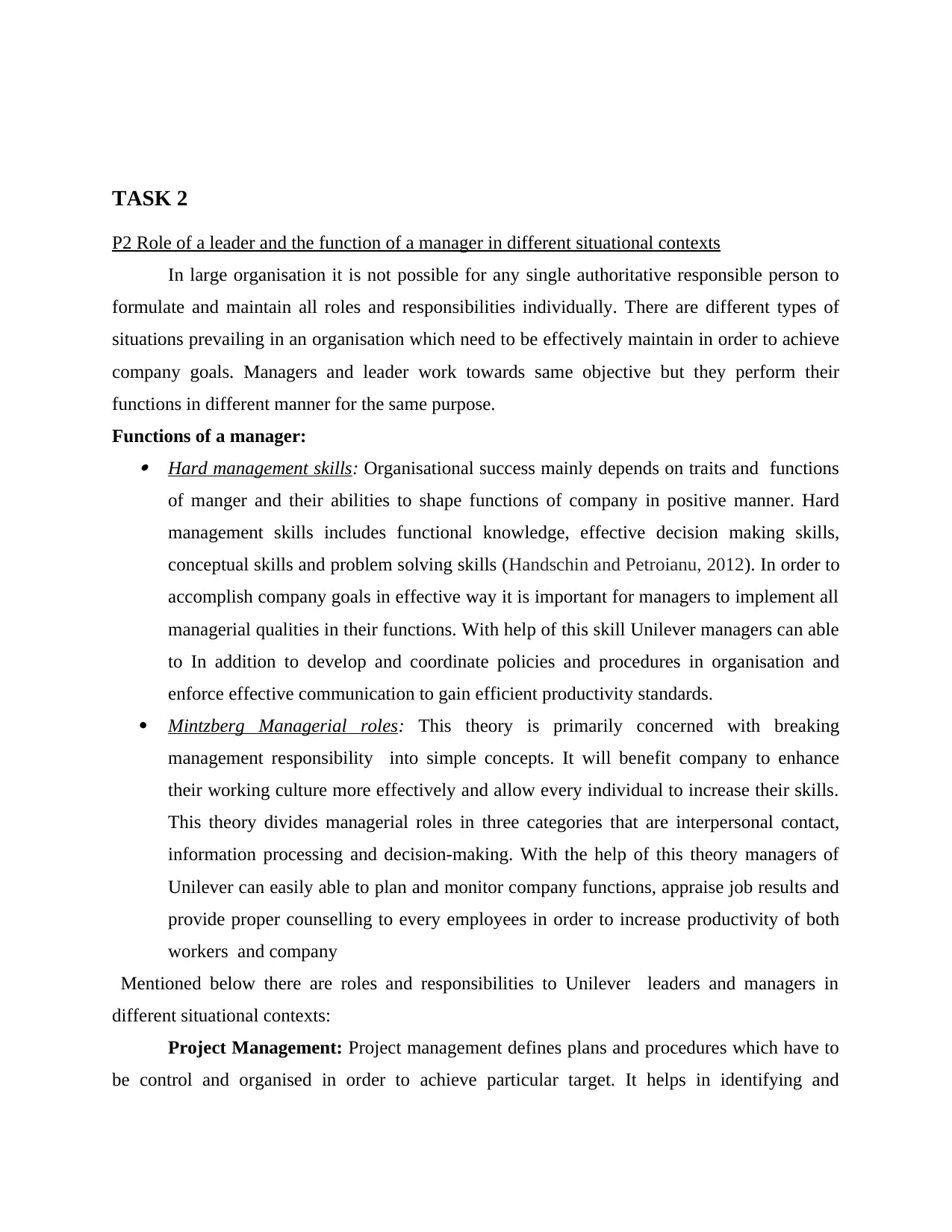
TASK 2
P2 Role of a leader and the function of a manager in different situational contexts
In large organisation it is not possible for any single authoritative responsible person to
formulate and maintain all roles and responsibilities individually. There are different types of
situations prevailing in an organisation which need to be effectively maintain in order to achieve
company goals. Managers and leader work towards same objective but they perform their
functions in different manner for the same purpose.
Functions of a manager: Hard management skills: Organisational success mainly depends on traits and functions
of manger and their abilities to shape functions of company in positive manner. Hard
management skills includes functional knowledge, effective decision making skills,
conceptual skills and problem solving skills (Handschin and Petroianu, 2012). In order to
accomplish company goals in effective way it is important for managers to implement all
managerial qualities in their functions. With help of this skill Unilever managers can able
to In addition to develop and coordinate policies and procedures in organisation and
enforce effective communication to gain efficient productivity standards.
Mintzberg Managerial roles: This theory is primarily concerned with breaking
management responsibility into simple concepts. It will benefit company to enhance
their working culture more effectively and allow every individual to increase their skills.
This theory divides managerial roles in three categories that are interpersonal contact,
information processing and decision-making. With the help of this theory managers of
Unilever can easily able to plan and monitor company functions, appraise job results and
provide proper counselling to every employees in order to increase productivity of both
workers and company
Mentioned below there are roles and responsibilities to Unilever leaders and managers in
different situational contexts:
Project Management: Project management defines plans and procedures which have to
be control and organised in order to achieve particular target. It helps in identifying and
P2 Role of a leader and the function of a manager in different situational contexts
In large organisation it is not possible for any single authoritative responsible person to
formulate and maintain all roles and responsibilities individually. There are different types of
situations prevailing in an organisation which need to be effectively maintain in order to achieve
company goals. Managers and leader work towards same objective but they perform their
functions in different manner for the same purpose.
Functions of a manager: Hard management skills: Organisational success mainly depends on traits and functions
of manger and their abilities to shape functions of company in positive manner. Hard
management skills includes functional knowledge, effective decision making skills,
conceptual skills and problem solving skills (Handschin and Petroianu, 2012). In order to
accomplish company goals in effective way it is important for managers to implement all
managerial qualities in their functions. With help of this skill Unilever managers can able
to In addition to develop and coordinate policies and procedures in organisation and
enforce effective communication to gain efficient productivity standards.
Mintzberg Managerial roles: This theory is primarily concerned with breaking
management responsibility into simple concepts. It will benefit company to enhance
their working culture more effectively and allow every individual to increase their skills.
This theory divides managerial roles in three categories that are interpersonal contact,
information processing and decision-making. With the help of this theory managers of
Unilever can easily able to plan and monitor company functions, appraise job results and
provide proper counselling to every employees in order to increase productivity of both
workers and company
Mentioned below there are roles and responsibilities to Unilever leaders and managers in
different situational contexts:
Project Management: Project management defines plans and procedures which have to
be control and organised in order to achieve particular target. It helps in identifying and
⊘ This is a preview!⊘
Do you want full access?
Subscribe today to unlock all pages.

Trusted by 1+ million students worldwide
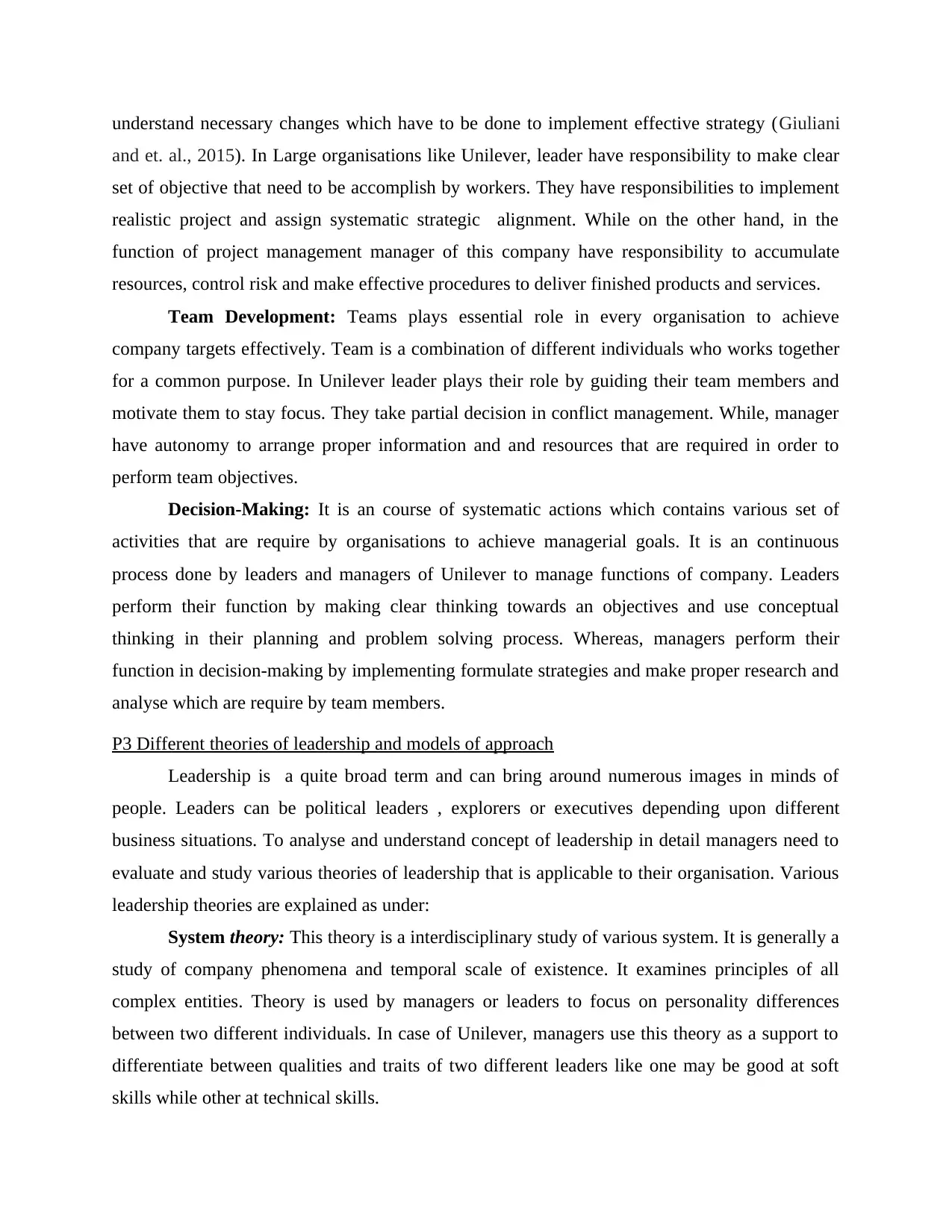
understand necessary changes which have to be done to implement effective strategy (Giuliani
and et. al., 2015). In Large organisations like Unilever, leader have responsibility to make clear
set of objective that need to be accomplish by workers. They have responsibilities to implement
realistic project and assign systematic strategic alignment. While on the other hand, in the
function of project management manager of this company have responsibility to accumulate
resources, control risk and make effective procedures to deliver finished products and services.
Team Development: Teams plays essential role in every organisation to achieve
company targets effectively. Team is a combination of different individuals who works together
for a common purpose. In Unilever leader plays their role by guiding their team members and
motivate them to stay focus. They take partial decision in conflict management. While, manager
have autonomy to arrange proper information and and resources that are required in order to
perform team objectives.
Decision-Making: It is an course of systematic actions which contains various set of
activities that are require by organisations to achieve managerial goals. It is an continuous
process done by leaders and managers of Unilever to manage functions of company. Leaders
perform their function by making clear thinking towards an objectives and use conceptual
thinking in their planning and problem solving process. Whereas, managers perform their
function in decision-making by implementing formulate strategies and make proper research and
analyse which are require by team members.
P3 Different theories of leadership and models of approach
Leadership is a quite broad term and can bring around numerous images in minds of
people. Leaders can be political leaders , explorers or executives depending upon different
business situations. To analyse and understand concept of leadership in detail managers need to
evaluate and study various theories of leadership that is applicable to their organisation. Various
leadership theories are explained as under:
System theory: This theory is a interdisciplinary study of various system. It is generally a
study of company phenomena and temporal scale of existence. It examines principles of all
complex entities. Theory is used by managers or leaders to focus on personality differences
between two different individuals. In case of Unilever, managers use this theory as a support to
differentiate between qualities and traits of two different leaders like one may be good at soft
skills while other at technical skills.
and et. al., 2015). In Large organisations like Unilever, leader have responsibility to make clear
set of objective that need to be accomplish by workers. They have responsibilities to implement
realistic project and assign systematic strategic alignment. While on the other hand, in the
function of project management manager of this company have responsibility to accumulate
resources, control risk and make effective procedures to deliver finished products and services.
Team Development: Teams plays essential role in every organisation to achieve
company targets effectively. Team is a combination of different individuals who works together
for a common purpose. In Unilever leader plays their role by guiding their team members and
motivate them to stay focus. They take partial decision in conflict management. While, manager
have autonomy to arrange proper information and and resources that are required in order to
perform team objectives.
Decision-Making: It is an course of systematic actions which contains various set of
activities that are require by organisations to achieve managerial goals. It is an continuous
process done by leaders and managers of Unilever to manage functions of company. Leaders
perform their function by making clear thinking towards an objectives and use conceptual
thinking in their planning and problem solving process. Whereas, managers perform their
function in decision-making by implementing formulate strategies and make proper research and
analyse which are require by team members.
P3 Different theories of leadership and models of approach
Leadership is a quite broad term and can bring around numerous images in minds of
people. Leaders can be political leaders , explorers or executives depending upon different
business situations. To analyse and understand concept of leadership in detail managers need to
evaluate and study various theories of leadership that is applicable to their organisation. Various
leadership theories are explained as under:
System theory: This theory is a interdisciplinary study of various system. It is generally a
study of company phenomena and temporal scale of existence. It examines principles of all
complex entities. Theory is used by managers or leaders to focus on personality differences
between two different individuals. In case of Unilever, managers use this theory as a support to
differentiate between qualities and traits of two different leaders like one may be good at soft
skills while other at technical skills.
Paraphrase This Document
Need a fresh take? Get an instant paraphrase of this document with our AI Paraphraser
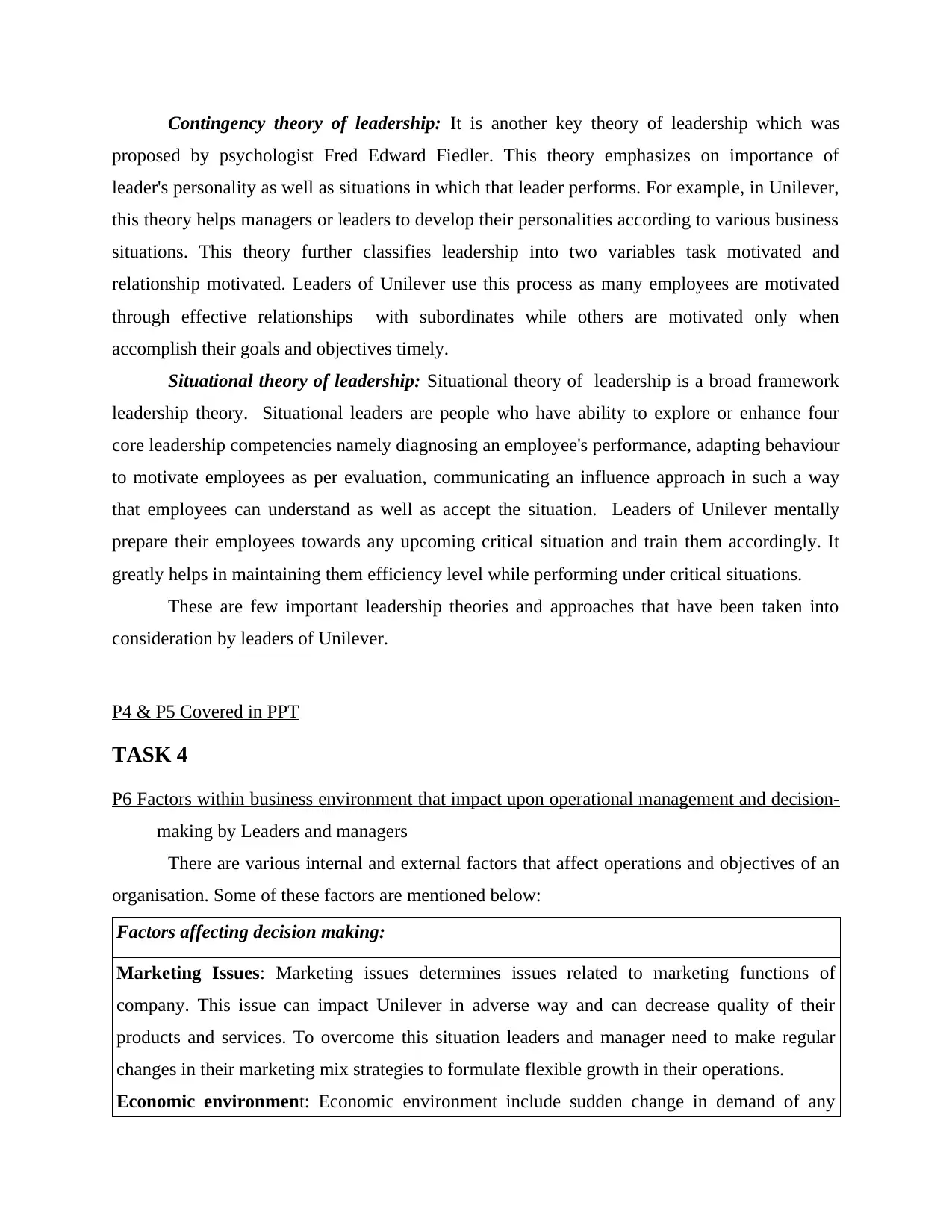
Contingency theory of leadership: It is another key theory of leadership which was
proposed by psychologist Fred Edward Fiedler. This theory emphasizes on importance of
leader's personality as well as situations in which that leader performs. For example, in Unilever,
this theory helps managers or leaders to develop their personalities according to various business
situations. This theory further classifies leadership into two variables task motivated and
relationship motivated. Leaders of Unilever use this process as many employees are motivated
through effective relationships with subordinates while others are motivated only when
accomplish their goals and objectives timely.
Situational theory of leadership: Situational theory of leadership is a broad framework
leadership theory. Situational leaders are people who have ability to explore or enhance four
core leadership competencies namely diagnosing an employee's performance, adapting behaviour
to motivate employees as per evaluation, communicating an influence approach in such a way
that employees can understand as well as accept the situation. Leaders of Unilever mentally
prepare their employees towards any upcoming critical situation and train them accordingly. It
greatly helps in maintaining them efficiency level while performing under critical situations.
These are few important leadership theories and approaches that have been taken into
consideration by leaders of Unilever.
P4 & P5 Covered in PPT
TASK 4
P6 Factors within business environment that impact upon operational management and decision-
making by Leaders and managers
There are various internal and external factors that affect operations and objectives of an
organisation. Some of these factors are mentioned below:
Factors affecting decision making:
Marketing Issues: Marketing issues determines issues related to marketing functions of
company. This issue can impact Unilever in adverse way and can decrease quality of their
products and services. To overcome this situation leaders and manager need to make regular
changes in their marketing mix strategies to formulate flexible growth in their operations.
Economic environment: Economic environment include sudden change in demand of any
proposed by psychologist Fred Edward Fiedler. This theory emphasizes on importance of
leader's personality as well as situations in which that leader performs. For example, in Unilever,
this theory helps managers or leaders to develop their personalities according to various business
situations. This theory further classifies leadership into two variables task motivated and
relationship motivated. Leaders of Unilever use this process as many employees are motivated
through effective relationships with subordinates while others are motivated only when
accomplish their goals and objectives timely.
Situational theory of leadership: Situational theory of leadership is a broad framework
leadership theory. Situational leaders are people who have ability to explore or enhance four
core leadership competencies namely diagnosing an employee's performance, adapting behaviour
to motivate employees as per evaluation, communicating an influence approach in such a way
that employees can understand as well as accept the situation. Leaders of Unilever mentally
prepare their employees towards any upcoming critical situation and train them accordingly. It
greatly helps in maintaining them efficiency level while performing under critical situations.
These are few important leadership theories and approaches that have been taken into
consideration by leaders of Unilever.
P4 & P5 Covered in PPT
TASK 4
P6 Factors within business environment that impact upon operational management and decision-
making by Leaders and managers
There are various internal and external factors that affect operations and objectives of an
organisation. Some of these factors are mentioned below:
Factors affecting decision making:
Marketing Issues: Marketing issues determines issues related to marketing functions of
company. This issue can impact Unilever in adverse way and can decrease quality of their
products and services. To overcome this situation leaders and manager need to make regular
changes in their marketing mix strategies to formulate flexible growth in their operations.
Economic environment: Economic environment include sudden change in demand of any
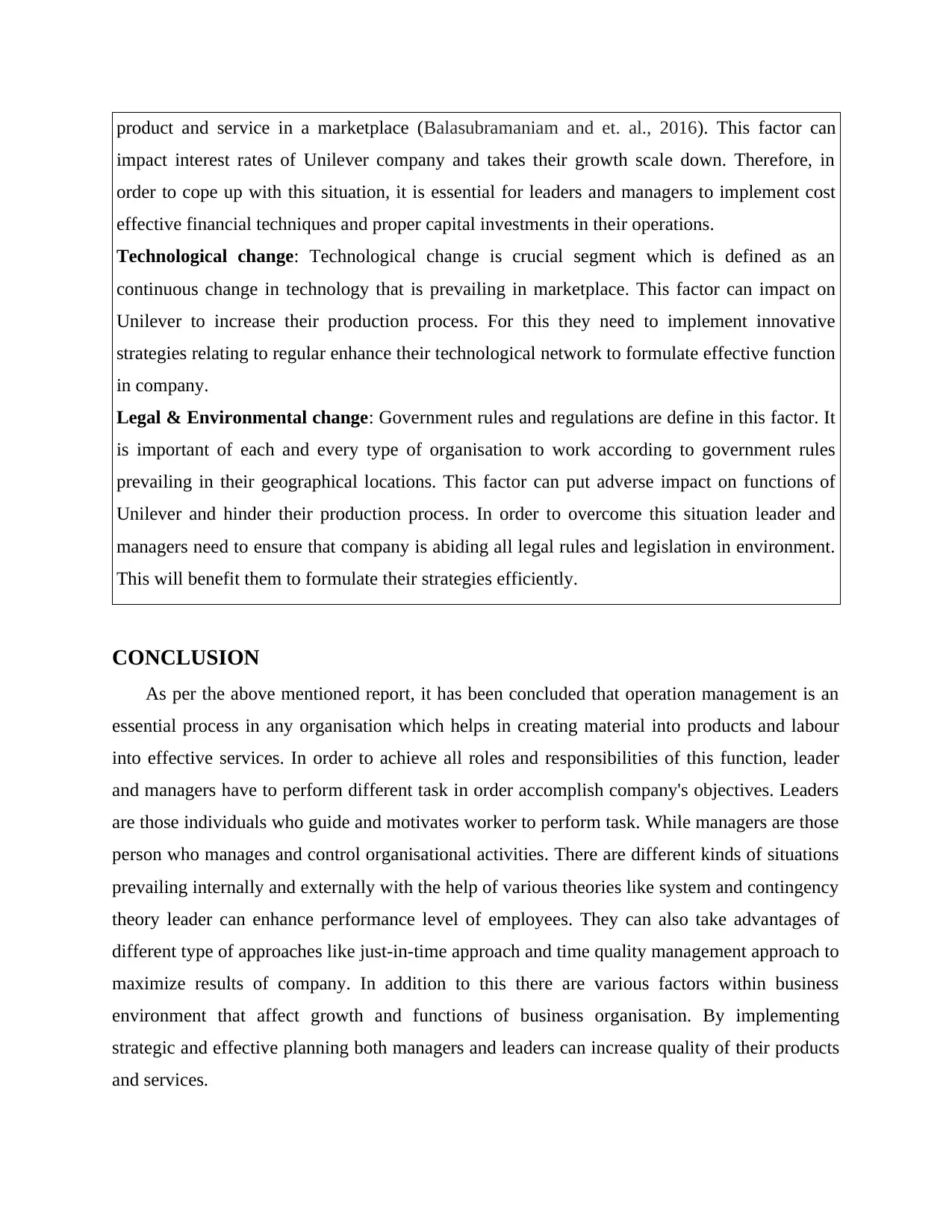
product and service in a marketplace (Balasubramaniam and et. al., 2016). This factor can
impact interest rates of Unilever company and takes their growth scale down. Therefore, in
order to cope up with this situation, it is essential for leaders and managers to implement cost
effective financial techniques and proper capital investments in their operations.
Technological change: Technological change is crucial segment which is defined as an
continuous change in technology that is prevailing in marketplace. This factor can impact on
Unilever to increase their production process. For this they need to implement innovative
strategies relating to regular enhance their technological network to formulate effective function
in company.
Legal & Environmental change: Government rules and regulations are define in this factor. It
is important of each and every type of organisation to work according to government rules
prevailing in their geographical locations. This factor can put adverse impact on functions of
Unilever and hinder their production process. In order to overcome this situation leader and
managers need to ensure that company is abiding all legal rules and legislation in environment.
This will benefit them to formulate their strategies efficiently.
CONCLUSION
As per the above mentioned report, it has been concluded that operation management is an
essential process in any organisation which helps in creating material into products and labour
into effective services. In order to achieve all roles and responsibilities of this function, leader
and managers have to perform different task in order accomplish company's objectives. Leaders
are those individuals who guide and motivates worker to perform task. While managers are those
person who manages and control organisational activities. There are different kinds of situations
prevailing internally and externally with the help of various theories like system and contingency
theory leader can enhance performance level of employees. They can also take advantages of
different type of approaches like just-in-time approach and time quality management approach to
maximize results of company. In addition to this there are various factors within business
environment that affect growth and functions of business organisation. By implementing
strategic and effective planning both managers and leaders can increase quality of their products
and services.
impact interest rates of Unilever company and takes their growth scale down. Therefore, in
order to cope up with this situation, it is essential for leaders and managers to implement cost
effective financial techniques and proper capital investments in their operations.
Technological change: Technological change is crucial segment which is defined as an
continuous change in technology that is prevailing in marketplace. This factor can impact on
Unilever to increase their production process. For this they need to implement innovative
strategies relating to regular enhance their technological network to formulate effective function
in company.
Legal & Environmental change: Government rules and regulations are define in this factor. It
is important of each and every type of organisation to work according to government rules
prevailing in their geographical locations. This factor can put adverse impact on functions of
Unilever and hinder their production process. In order to overcome this situation leader and
managers need to ensure that company is abiding all legal rules and legislation in environment.
This will benefit them to formulate their strategies efficiently.
CONCLUSION
As per the above mentioned report, it has been concluded that operation management is an
essential process in any organisation which helps in creating material into products and labour
into effective services. In order to achieve all roles and responsibilities of this function, leader
and managers have to perform different task in order accomplish company's objectives. Leaders
are those individuals who guide and motivates worker to perform task. While managers are those
person who manages and control organisational activities. There are different kinds of situations
prevailing internally and externally with the help of various theories like system and contingency
theory leader can enhance performance level of employees. They can also take advantages of
different type of approaches like just-in-time approach and time quality management approach to
maximize results of company. In addition to this there are various factors within business
environment that affect growth and functions of business organisation. By implementing
strategic and effective planning both managers and leaders can increase quality of their products
and services.
⊘ This is a preview!⊘
Do you want full access?
Subscribe today to unlock all pages.

Trusted by 1+ million students worldwide
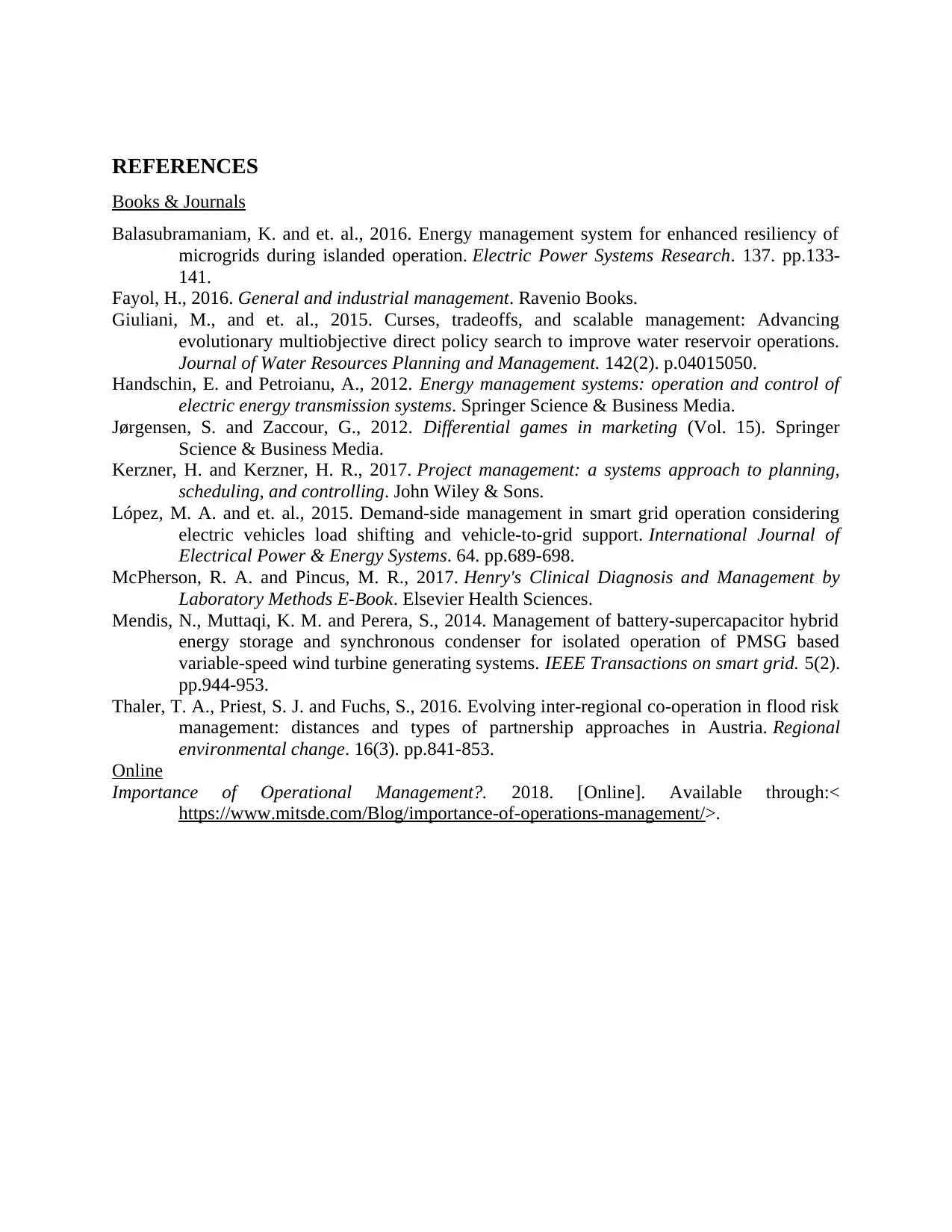
REFERENCES
Books & Journals
Balasubramaniam, K. and et. al., 2016. Energy management system for enhanced resiliency of
microgrids during islanded operation. Electric Power Systems Research. 137. pp.133-
141.
Fayol, H., 2016. General and industrial management. Ravenio Books.
Giuliani, M., and et. al., 2015. Curses, tradeoffs, and scalable management: Advancing
evolutionary multiobjective direct policy search to improve water reservoir operations.
Journal of Water Resources Planning and Management. 142(2). p.04015050.
Handschin, E. and Petroianu, A., 2012. Energy management systems: operation and control of
electric energy transmission systems. Springer Science & Business Media.
Jørgensen, S. and Zaccour, G., 2012. Differential games in marketing (Vol. 15). Springer
Science & Business Media.
Kerzner, H. and Kerzner, H. R., 2017. Project management: a systems approach to planning,
scheduling, and controlling. John Wiley & Sons.
López, M. A. and et. al., 2015. Demand-side management in smart grid operation considering
electric vehicles load shifting and vehicle-to-grid support. International Journal of
Electrical Power & Energy Systems. 64. pp.689-698.
McPherson, R. A. and Pincus, M. R., 2017. Henry's Clinical Diagnosis and Management by
Laboratory Methods E-Book. Elsevier Health Sciences.
Mendis, N., Muttaqi, K. M. and Perera, S., 2014. Management of battery-supercapacitor hybrid
energy storage and synchronous condenser for isolated operation of PMSG based
variable-speed wind turbine generating systems. IEEE Transactions on smart grid. 5(2).
pp.944-953.
Thaler, T. A., Priest, S. J. and Fuchs, S., 2016. Evolving inter-regional co-operation in flood risk
management: distances and types of partnership approaches in Austria. Regional
environmental change. 16(3). pp.841-853.
Online
Importance of Operational Management?. 2018. [Online]. Available through:<
https://www.mitsde.com/Blog/importance-of-operations-management/>.
Books & Journals
Balasubramaniam, K. and et. al., 2016. Energy management system for enhanced resiliency of
microgrids during islanded operation. Electric Power Systems Research. 137. pp.133-
141.
Fayol, H., 2016. General and industrial management. Ravenio Books.
Giuliani, M., and et. al., 2015. Curses, tradeoffs, and scalable management: Advancing
evolutionary multiobjective direct policy search to improve water reservoir operations.
Journal of Water Resources Planning and Management. 142(2). p.04015050.
Handschin, E. and Petroianu, A., 2012. Energy management systems: operation and control of
electric energy transmission systems. Springer Science & Business Media.
Jørgensen, S. and Zaccour, G., 2012. Differential games in marketing (Vol. 15). Springer
Science & Business Media.
Kerzner, H. and Kerzner, H. R., 2017. Project management: a systems approach to planning,
scheduling, and controlling. John Wiley & Sons.
López, M. A. and et. al., 2015. Demand-side management in smart grid operation considering
electric vehicles load shifting and vehicle-to-grid support. International Journal of
Electrical Power & Energy Systems. 64. pp.689-698.
McPherson, R. A. and Pincus, M. R., 2017. Henry's Clinical Diagnosis and Management by
Laboratory Methods E-Book. Elsevier Health Sciences.
Mendis, N., Muttaqi, K. M. and Perera, S., 2014. Management of battery-supercapacitor hybrid
energy storage and synchronous condenser for isolated operation of PMSG based
variable-speed wind turbine generating systems. IEEE Transactions on smart grid. 5(2).
pp.944-953.
Thaler, T. A., Priest, S. J. and Fuchs, S., 2016. Evolving inter-regional co-operation in flood risk
management: distances and types of partnership approaches in Austria. Regional
environmental change. 16(3). pp.841-853.
Online
Importance of Operational Management?. 2018. [Online]. Available through:<
https://www.mitsde.com/Blog/importance-of-operations-management/>.
1 out of 10
Related Documents
Your All-in-One AI-Powered Toolkit for Academic Success.
+13062052269
info@desklib.com
Available 24*7 on WhatsApp / Email
![[object Object]](/_next/static/media/star-bottom.7253800d.svg)
Unlock your academic potential
Copyright © 2020–2026 A2Z Services. All Rights Reserved. Developed and managed by ZUCOL.





